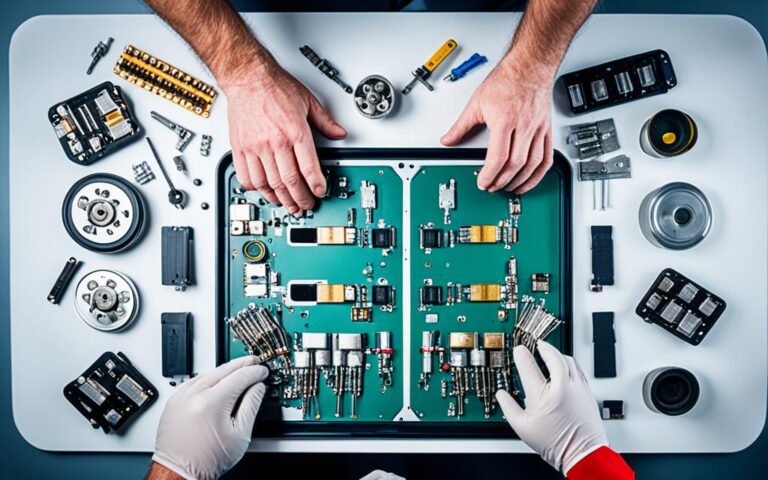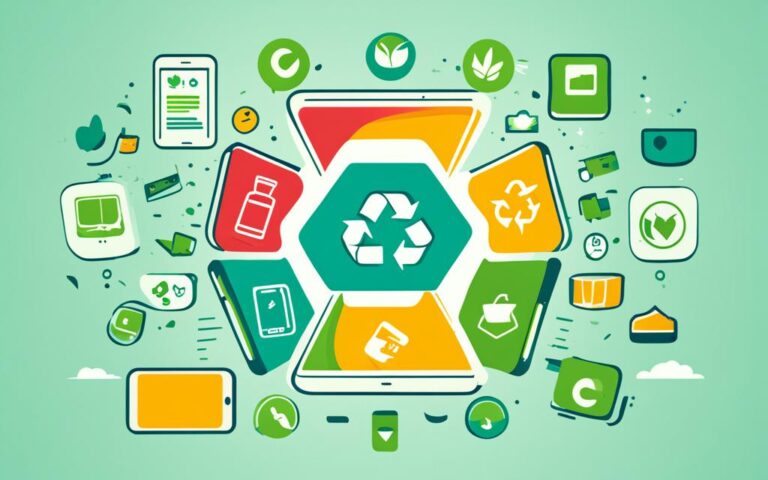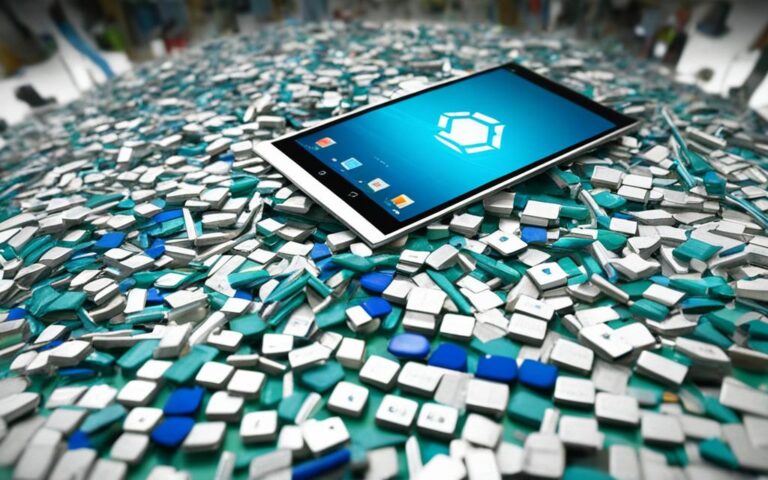The Role of Technology in Enhancing Phone and Tablet Recycling
Electronic waste, or e-waste, is a growing problem globally. It is estimated that the total amount of e-waste generated around the world this year will reach a record 57.4 million tonnes, with projections of reaching 74 million tonnes by 2030. The high consumption rates of electronics, particularly in the smartphone industry, contribute to this significant growth. However, the recycling levels for e-waste are still relatively low, with only around 17% of electronics being properly treated and recycled in 2019.
Recycling old and unused devices can have a significant impact on reducing the environmental footprint of the industry, as it saves resources and reduces carbon dioxide emissions. Additionally, it helps keep toxic and precious materials out of landfills and creates job opportunities in the e-waste recycling sector.
In this article, we will explore how technology is playing a vital role in enhancing the recycling of phones and tablets. By leveraging technology, we can address the sustainability challenges posed by electronic waste while creating a more eco-responsible future.
Continue reading to learn more about the environmental benefits, social and economic impacts, and the introduction of ecoATM, a sustainable solution for tech recycling.
The Environmental Benefits of Recycling Electronics
Recycling electronics, such as phones and tablets, offers several environmental benefits. Firstly, it helps keep toxic materials, such as heavy metals and flame retardants, out of landfills, reducing the risk of soil and groundwater contamination. Secondly, it prevents valuable materials like gold, silver, platinum, and rare earth metals from going to waste. These materials can be reclaimed and reused, reducing the need for mining and manufacturing, which in turn conserves natural resources. Furthermore, recycling electronic devices helps reduce the amount of waste that ends up in landfills, contributing to the overall waste management and sustainability efforts. Lastly, responsible recycling practices help improve the health of people worldwide, as improper handling of e-waste can have adverse effects on the environment and the individuals involved in handling and processing it.
The Social and Economic Impacts of Recycling Electronics
Recycling electronics not only has significant environmental benefits but also has important social and economic impacts. By recycling old devices, individuals who cannot afford new ones have the opportunity to stay connected in today’s digital world. Refurbished devices are often more affordable, making technology more accessible to a wider range of people. This enhances connectivity and ensures that no one is left behind in the digital age.
E-waste recycling programs also create job opportunities in the recycling industry. In 2016 alone, approximately 20,000 to 30,000 jobs were created in electronics recycling. These programs not only contribute to the local economy but also provide employment opportunities for marginalized communities. By participating in e-waste recycling, individuals can support job growth and economic development in their communities.
“Recycling turns things into other things, which is like MAGIC.”
However, it is essential to address the issue of stolen phones being turned in for recycling. This unethical practice undermines the integrity of the recycling process and poses challenges for responsible recycling companies like ecoATM. To combat this issue, stringent measures need to be in place to verify the ownership of devices and prevent stolen phones from entering the recycling stream. By tackling this problem, we can ensure that the benefits of e-waste recycling are not compromised and that the industry continues to thrive.
The Impact of Recycling on Pricing
One of the key factors that make recycled devices more affordable is the impact on pricing. By recycling and refurbishing electronic devices, the cost of production and manufacturing is significantly reduced. This cost savings can then be passed on to consumers, allowing them to purchase technology at more affordable prices. Recycling not only benefits the environment but also helps bridge the digital divide by making technology more accessible to all.
Supporting Sustainability and Responsible Consumption
Recycling electronics is not just a matter of convenience or affordability; it is a crucial step towards building a sustainable future. By recycling and reusing devices, we can significantly reduce the demand for new electronic products, thereby minimizing the extraction of raw materials and the energy-intensive manufacturing processes. This contributes to the overall goal of responsible consumption and promotes a circular economy where resources are conserved and reused.
Preventing E-Waste Dumping in Developing Countries
Another important aspect of recycling electronics is the prevention of e-waste dumping in developing countries. When electronic devices are not properly recycled, they often end up in countries with less stringent environmental regulations. This leads to the improper disposal and handling of hazardous materials, posing risks to both the environment and the health of communities. By recycling our electronic devices responsibly, we can help eliminate the practice of e-waste dumping and protect vulnerable communities from the harmful effects of toxic substances.
Introducing ecoATM: A Sustainable Solution for Tech Recycling
When it comes to electronic waste recycling, ecoATM sets the bar high with its innovative and sustainable approach. With strategically placed automated kiosks in easily accessible locations, ecoATM provides a convenient solution for individuals to recycle their old phones, tablets, and other devices. These kiosks assess the devices based on brand, model, and condition, offering users an instant offer for their electronics.
EcoATM’s commitment to sustainability is evident in its efforts to reduce e-waste and its environmental impact. By encouraging responsible recycling practices, ecoATM plays a crucial role in preventing harmful chemicals and metals from leaching into the environment. Additionally, the company’s model conserves valuable materials, reducing the need for mining and manufacturing.
Not only does ecoATM prioritize environmental sustainability, but it also offers immediate benefits to users. If the offer provided by the kiosk is accepted, an immediate payout is given in the form of cash or electronic gift cards. This provides individuals with an incentive to recycle their devices responsibly, promoting a more circular economy.
EcoATM’s revolutionary approach to electronic waste recycling goes beyond the environmental and economic aspects. It sets an example for other companies and individuals, reshaping the perception of recycling and fostering a more sustainable future for everyone.
By choosing ecoATM, individuals can make a significant impact on the environment while also contributing to the global effort of electronic waste recycling. Together, we can create a greener and cleaner world for generations to come.
Conclusion
As the world continues to witness rapid technological advancements, it is crucial to prioritize responsible e-waste management. The role of technology in enhancing the recycling of phones and tablets cannot be overstated. Through innovative solutions like ecoATM’s automated kiosks, we can make recycling more accessible and convenient for consumers.
By embracing responsible recycling practices, we not only protect the environment but also prevent valuable materials from going to waste. This contributes to the circular economy by conserving resources and reducing the need for mining and manufacturing.
Furthermore, responsible recycling practices create job opportunities in the e-waste recycling sector, fostering economic growth and supporting marginalized communities. It is important for individuals and businesses to make eco-responsible choices and actively participate in safeguarding our planet for future generations.
FAQ
How does recycling electronics contribute to reducing environmental impact?
Recycling electronics helps keep toxic materials, such as heavy metals and flame retardants, out of landfills, reducing the risk of soil and groundwater contamination. It also prevents valuable materials like gold, silver, platinum, and rare earth metals from going to waste, reducing the need for mining and manufacturing and conserving natural resources. Furthermore, recycling electronic devices helps reduce the amount of waste that ends up in landfills, contributing to overall waste management and sustainability efforts.
What are the social and economic benefits of recycling electronics?
Recycling old devices allows individuals who cannot afford new ones to stay connected in the digital world. Refurbished devices are often more affordable, making technology more accessible to more people. Additionally, e-waste recycling programs create job opportunities in the recycling industry, contributing to the local economy and providing employment opportunities for marginalized communities.
How does ecoATM contribute to electronic waste recycling?
ecoATM offers an easy and sustainable solution for recycling electronics. Their automated kiosks are conveniently located and allow users to deposit their old phones, tablets, and other devices for assessment. The kiosks evaluate the devices based on brand, model, and condition and provide users with an instant offer. If accepted, users receive an immediate payout in the form of cash or electronic gift cards. ecoATM’s model encourages responsible recycling practices and helps prevent harmful chemicals and metals from leaching into the environment, conserves valuable materials, and reduces the need for mining and manufacturing.
How does technology enhance phone and tablet recycling?
Leveraging technology, such as automated kiosks like those offered by ecoATM, makes recycling more accessible and convenient for consumers. By incorporating technology into the recycling process, we can improve efficiency and encourage more people to participate in responsible e-waste management.
What can individuals and businesses do to contribute to responsible e-waste management?
Individuals and businesses have the power to make eco-responsible choices by recycling their old and unused devices through reputable programs like ecoATM. This contributes to safeguarding our planet for future generations and promotes a circular economy. By prioritizing sustainable practices and recycling technologies, we can protect the environment, conserve valuable resources, and create a more sustainable future.















